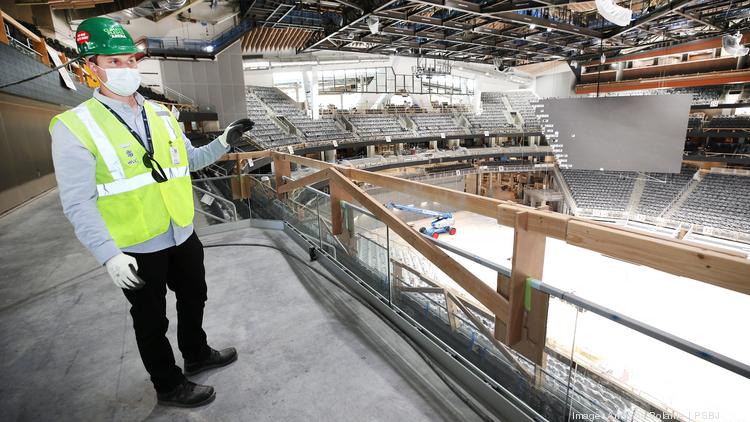
Climate Pledge Arena courts sustainable vendors, concerts with new layout as opening day nears (Bizjournals)
Read the original article here.
When the much-anticipated Climate Pledge Arena opens its doors this fall, it’ll be the spaces fans don’t see that draw in the headliner events.
Construction is nearing completion on the $1 billion development at Seattle Center, which will be home to the city’s newly established NHL team, the Kraken. The central concrete slab is slated for painting and chilling in anticipation of the pouring of the ice in early September. Crews are beginning the installation of thousands of LED screens in the newly completed Alaska Airlines atrium at the south end of the building, leading fans into sweeping concourses leading into the stadium.
But it’s underground elements like private dressing rooms and a $100 million overhaul to add eight loading bays that give trucks access right up to the ice which will enable the arena to attract the kinds of A-list performances and events it’s banking on.
Large events and concerts “required so much technology, with boards and digital elements, it just became unattainable,” with the previous layout, where just two loading docks met at a single freight elevator, said Sam Morgan, director of corporate partnerships for the Seattle Kraken. “There’s no longer this bottleneck.”
Sam Morgan, director of corporate partnerships for the Seattle Kraken, stands on a loge overlooking the ice during the final phase of construction at Climate Pledge Arena.
The historic roof, which was a centerpiece of the design, has been outfitted with acoustic paneling for musical events. With comedy and music performances from the Eagles to Billie Eilish to Trevor Noah booked through August 2022, there’s been a “rubber-band effect” of pent-up demand from fans eager for the return of tours, said Jeff Webster, Kraken vice president of corporate partnerships.
“It’s almost double the amount of shows that’s typical for a normal calendar year,” he said.
That’s left little bandwidth for corporate events around the team’s schedule, but connecting with the Seattle business community is still top of mind, Webster said.
The back-of-house designs have helped attract vendors that share the arena’s sustainability mission, while interior designs by New York-based architecture firm Rockwell Group have added 59 suites and several club and restaurant spaces. That will support anything from 200-person company retreats to 15,000-person conferences and trade shows, Webster said.
With the onset of the pandemic, design crews were able to incorporate an air filtration system and touch-free ticket scanning and marketplaces for event-goers, said marketing and communications lead Katie Townsend.
The arena is 51% owned by development company Oak View Group, led by sports venue designer Tim Leiweke, older brother to Kraken CEO Tod Leiweke. Kraken owner David Bonderman and his partners make up the rest of the development’s ownership.
Thanks to a solar installation that will power the all-electric building and construction practices that reclaimed or recycled many of the materials for the build, the arena will be net-zero carbon certified, living up to the name chosen by Amazon when it bought the naming rights for $300 million.
The budget for the project initially came in at $930 million but has since topped $1 billion, all paid for with private financing. Townsend attributed the overruns to the task of suspending the roof during the build, as well as the cost of sustainable materials and electrification.
“The engineering that went into that was slightly more expensive than anticipated,” she said.
Household brands like Amazon and Starbucks have been key to driving the project to the finish line, Webster said.
“We’ve borrowed some of their (brand) equity,” he said “We’ve got some tricks up our sleeve with how we’re activating these partners. We got to imagine it with them as we were designing it, instead of designing it ourselves and then putting their name on it. … We really started from scratch, which was kind of the dream scenario for everyone.”
